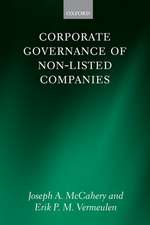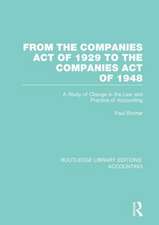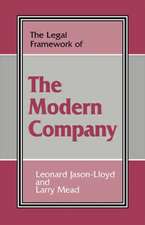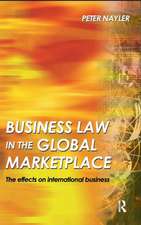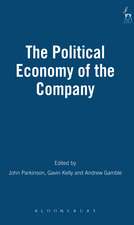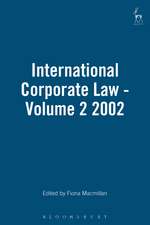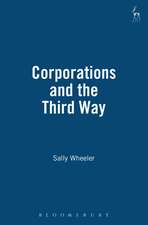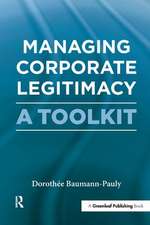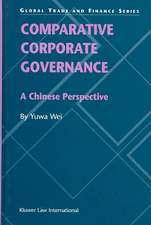Business and Human Rights: From Principles to Practice
Autor Dorothée Baumann-Pauly, Justine Nolanen Limba Engleză Paperback – 13 apr 2016
Business and Human Rights: From Principles to Practice is the first comprehensive and interdisciplinary textbook that addresses these issues. It examines the regulatory framework that grounds the business and human rights debate and highlights the business and legal challenges faced by companies and stakeholders in improving respect for human rights, exploring such topics as:
- the regulatory framework that grounds the business and human rights debate
- challenges faced by companies and stakeholders in improving human rights
- industry-specific human rights standards
- current mechanisms to hold corporations to account
- future challenges for business and human rights
| Toate formatele și edițiile | Preț | Express |
|---|---|---|
| Paperback (1) | 372.41 lei 3-5 săpt. | +25.25 lei 4-10 zile |
| Taylor & Francis – 13 apr 2016 | 372.41 lei 3-5 săpt. | +25.25 lei 4-10 zile |
| Hardback (1) | 1278.08 lei 6-8 săpt. | |
| Taylor & Francis – 14 apr 2016 | 1278.08 lei 6-8 săpt. |
Preț: 372.41 lei
Nou
Puncte Express: 559
Preț estimativ în valută:
71.27€ • 77.39$ • 59.87£
71.27€ • 77.39$ • 59.87£
Carte disponibilă
Livrare economică 01-15 aprilie
Livrare express 15-21 martie pentru 35.24 lei
Preluare comenzi: 021 569.72.76
Specificații
ISBN-13: 9781138833562
ISBN-10: 1138833568
Pagini: 350
Dimensiuni: 156 x 234 x 22 mm
Greutate: 0.52 kg
Ediția:1
Editura: Taylor & Francis
Colecția Routledge
Locul publicării:Oxford, United Kingdom
ISBN-10: 1138833568
Pagini: 350
Dimensiuni: 156 x 234 x 22 mm
Greutate: 0.52 kg
Ediția:1
Editura: Taylor & Francis
Colecția Routledge
Locul publicării:Oxford, United Kingdom
Public țintă
Postgraduate and UndergraduateRecenzii
"An important contribution to a vital subject, this excellent primer on business and human rights offers valuable insight for both current and future practitioners. Recognizing the challenges and preparing effectively are vital to drive responsible and sustainable business."
Paul Polman – Chief Executive Officer, Unilever
"Baumann-Pauly and Nolan have written an important and ambitious book, tackling a topic that remains increasingly urgent and still understudied: how to integrate human rights concerns into global business. The editors skillfully examine the complex history of this topic and sketch out a number of realistic strategies that stakeholders can use to bring human rights issues more forcefully into the corporate environment. The book will be a useful tool for educating both future and current business leaders."
Debora Spar - President, Barnard College, Columbia University, New York, USA.
Paul Polman – Chief Executive Officer, Unilever
"Baumann-Pauly and Nolan have written an important and ambitious book, tackling a topic that remains increasingly urgent and still understudied: how to integrate human rights concerns into global business. The editors skillfully examine the complex history of this topic and sketch out a number of realistic strategies that stakeholders can use to bring human rights issues more forcefully into the corporate environment. The book will be a useful tool for educating both future and current business leaders."
Debora Spar - President, Barnard College, Columbia University, New York, USA.
Cuprins
Chapter 1 The relationship of human rights to business; Business and human rights in context, JustineNolan; Making the business case for human rights: an assessment, DorothéeBaumann-Pauly, MichaelPosner; Bhopal: the saga continues 31 years on, SuryaDeva; Rana Plaza: the collapse of a factory in Bangladesh and its ramifications for the global garment industry, JustineNolan; Chapter 2 Regulatory framework and Guiding Principles; Mapping the movement: the business and human rights regulatory framework, JustineNolan; The United Nations ‘Protect, Respect, Remedy’ Framework and Guiding Principles, ChipPitts; Incorporating human rights: lessons learned, and next steps, John GerardRuggie; A business and human rights treaty, JustineNolan; Towards a business and human rights treaty?, ArvindGanesan; Chapter 3 Business and human rights; From side show to main act: can business and human rights save corporate responsibility?, FlorianWettstein; Implementing human rights in global business: high performance with high integrity, Ben W.HeinemanJr.; Human rights ‘intrapreneurs’: challenges and keys to success, ChristineBader; The social licence: one way of thinking about business and human rights, JohnMorrison; Salient human rights issues: when severe risks to people intersect with risks to business, CarolineRees, RachelDavis; Chapter 4 Defining and implementing human rights standards industry by industry; Setting and enforcing industry-specific standards for human rights: the role of multi-stakeholder initiatives in regulating corporate conduct, DorothéeBaumann-Pauly, JustineNolan, SarahLabowitz, Auretvan Heerden; The Fair Labor Association: improving workers’ rights in global supply chains, Auretvan Heerden; The Global Network Initiative: how can companies in the information and communications technology industry respect human rights?, MichaelSamway; Extractives and multi-stakeholder initiatives: the Voluntary Principles on Security and Human Rights; the Extractive Industries Transparency Initiative; the Kimberley Process Certification Scheme, ScottJerbi; The emergence of the International Code of Conduct for Private Security Service Providers, Anne-MarieBuzatu; Standard setting for agriculture, MichaelPosner; The Coalition of Immokalee Workers and the Campaign for Fair Food: the evolution of a business and human rights campaign, JoanneBauer; Chapter 5 Key constituents that drive the implementation of business and human rights; The role of civil society in business and human rights, ChrisJochnick, LouisBickford; Workers’ rights in the business and human rights movement, BarbaraShailor; Shopping for a better world: how consumer decisions can help to promote sustainability and human rights, GuidoPalazzo, FelicitasMorhart, JudithSchrempf-Stirling; Investors: models and strategies for engaging with human rights, MaryDowell-Jones; Thinking long-term: investment strategies and responsibility, Mattie J.Bekink; Investors and human rights: values, risk and materiality, BennettFreeman; Chapter 6 Accountability and remedy; The meaning of accountability, SimonZadek; Introduction to Sections; Business and human rights litigation in US courts before and after Kiobel, William S.Dodge; Holding multinational corporations accountable for human rights violations: litigation outside the United States, ChristineKaufmann; Access to remedy: non-judicial grievance mechanisms, KristenGenovese; Introduction to Sections; The rise of non-financial disclosure: reporting on respect for human rights, AmolMehra, SaraBlackwell; Mandatory human rights reporting, Anthony P.Ewing; Chapter 7 Global rules, private actors We live in a world of global supply chains, Richard M.Locke; The future of business and human rights: challenges and opportunities, DorothéeBaumann-Pauly, JustineNolan, MichaelPosner;
Descriere
Business and Human Rights is the first book of its kind in this rapidly growing area of teaching and research. Over 30 contributors present a comprehensive and interdisciplinary overview of the topic. The clearly structured volume addresses current and future business leaders, students and teachers at law and business schools as well as a broader audience that would like to gain a better understanding of business and human rights.
Illustrated throughout with case studies and snapshot features that highlight real-world examples, the book outlines the business and human rights movement, explores the legal framework for business and human rights, highlights the practical implementation challenges and standard-setting frameworks in different industries (manufacturing, ICT, private security, extractives, agriculture), and it discusses the future of the business and human rights field.
Illustrated throughout with case studies and snapshot features that highlight real-world examples, the book outlines the business and human rights movement, explores the legal framework for business and human rights, highlights the practical implementation challenges and standard-setting frameworks in different industries (manufacturing, ICT, private security, extractives, agriculture), and it discusses the future of the business and human rights field.



